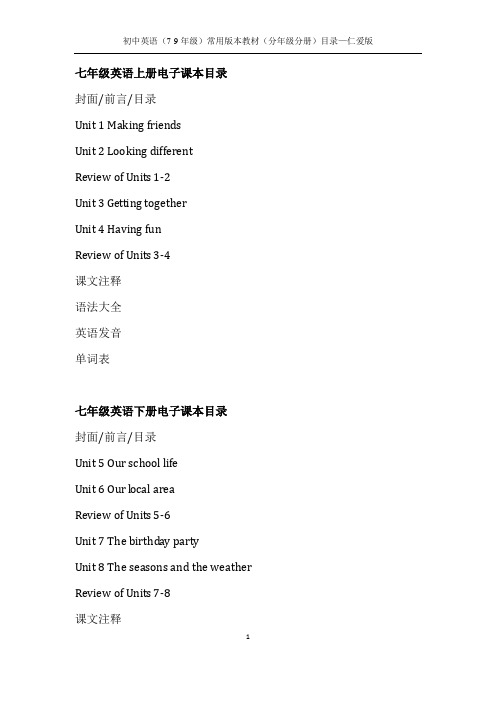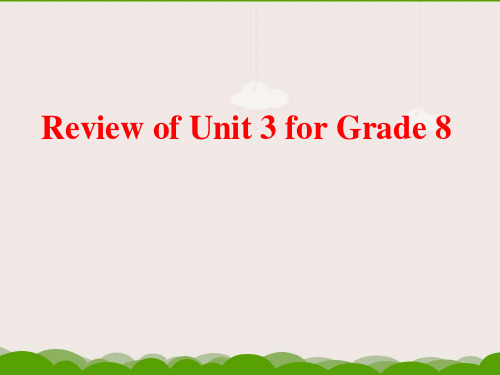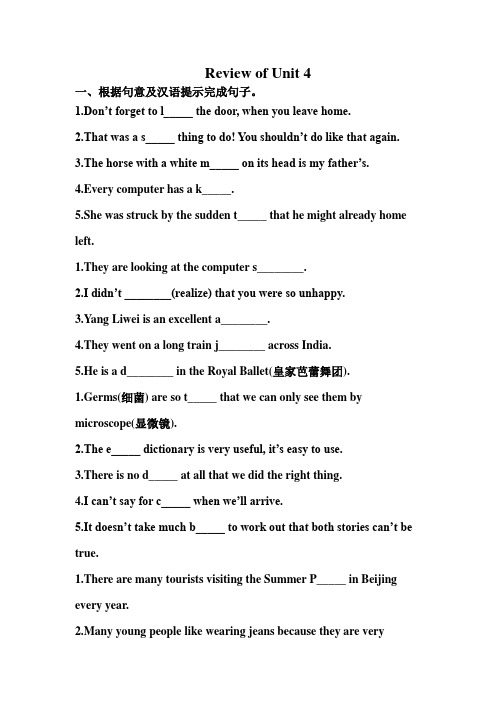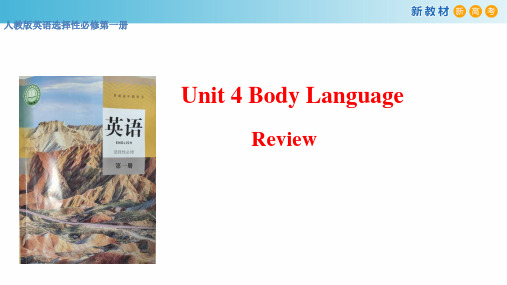Review of Unit 4
【课件】Unit+4Review+of+phrases语法课件人教版高中英语选择性必修第四册

指示代词(this、that、these、
其二是形容词,用来表示名词的性质和特征。比如yellow、big those等)、物主代词(my、
等。
your、his、her、our、their
(3)名词短语的功能用法:
等)和不定代词(some、no、
名词短语可以作主语、宾语或表语。
neither、both等)。
her as a doctor. 5.When their children lived far away from them, these old people felt cut
__o_f_f__from the world.
6. I hate it when she calls me at work—I'm always too busy to carry ___in___ a conversation with her. 7. I'm going to take advantage ___o_f __ this tour to explore the history of the castle. 8. Many businesses started up by college students have taken ___o_ff__ thanks to the comfortable climate for business creation. 9. Traditional Chinese paintings appeal very much ___t_o___ me. 10.Body language can give ___a_w_a_y__ a lot about your mood,so standing with your arms folded can send out a signal that you are being defensive.
研究生英语听说教程(提高级第三版)Unit5

2. Decoration
3. Food and drink
Special with balloons, candles and things on the walls
Enough, easy to take with hands to reduce washing up
4. Music
5. People
Activity 1: Discussion
Work in pairs and answer the following questions. Have you been to a party? If yes, what sort of party was it? What did you do and how did you feel?
Listen to the recording and note down the definition of party and the ways it can be used.
A party is a social gathering often to celebrate a special event, such as a birthday. party n. party v. Arrange a party I love to party. Have a party party out Throw a party Host a party A partygoer A party animal A party pooper
•
Make an affirmative statement that would allow surrounding people to “jump in” • “Wow it’s hot / cold today…”
跨文化交际UNIT-5

Supplement: Verbal Communication
3. Elaborate, Exacting and Succinct Styles ▪ Compare the followings: ▪ Arab: @#%&$%~$*&`^%#@... … ▪ American: Just the facts! ▪ Chinese: Silence is Golden.
Supplement: Verbal Communication
Verbal Communication Styles (p179-183) : ▪ Direct / Indirect ▪ Self-enhancement / Self-effacement ▪ Elaborate / Exacting / Succinct ▪ Personal / Contextual ▪ Instrumental / Affective
Supplement: Verbal Communication
4. Personal and Contextual Style ▪ The personal communication style emphasizes the
individual identity of the speaker. Eg. English has only one form for the second person, that is, you. ▪ The contextual style highlights one’s role identity and status. Eg. Chinese, German and French, for example, have informal and formal forms of the pronoun you (你/您; du/Sie; tu/vous).
Review of 7B unit3&4

教案背景
• 在初三下学期, 面临中考,要想在中考取 得理想的成绩,就要抓住每个单元的知识 重点和难点,结合中考,在有限的时间内 有效复习整个初中的英语知识。本课为复 习七级下册uint3、uint4两个单元的知识。
教材分析
• 本课的教学内容为复习七年级下册英语 本课的教学内容为复习七年级下册英语unit3和unit4两个 和 两个 单元。话题分别为谈论动物和工作职业, 单元。话题分别为谈论动物和工作职业,语法知识点为复 习特殊疑问句的构成和运用。 习特殊疑问句的构成和运用。 • Unit3教学目标: 教学目标: 教学目标 谈论自己的喜好;询问他和人喜好; 谈论自己的喜好;询问他和人喜好;能够谈论喜爱某种动 物的理由做出自己的行动计划。 物的理由做出自己的行动计划。 语言目标: 语言目标: • 使用 使用like的一般现在时句型 的一般现在时句型 • 使用 使用like的一般现在时的疑问句,并做出肯定和否定的回 的一般现在时的疑问句, 的一般现在时的疑问句 答。 • 使用 使用what 和like的特殊疑问句 的特殊疑问句 • 名词的单复数的使用
interesting/exciting It is an_____________and busy __________job.
特殊疑问句
1.定义:用特殊疑问词引导的疑问句叫特殊疑句。 2.疑问词:疑问代词、疑问副词、疑问词组。 疑问代词:对主语、表语、宾语提问,有what(对 “物”提问),who(对“人”提问),which(哪一个), whose(谁的),whom(宾格“谁”)。 疑问副词:用于对状语提问,有when(何时), where(何地),why(为什么)how(怎么样)。 疑问词组:how soon ,how long ,how far , how often 等。
仁爱英语七年级上册教学计划

仁爱英语七年级上册教学计划仁爱英语七年级上册教学准备时间过得真快,总在不经意间消逝,老师们的教学工作又将有新的目标,写好教学准备才不会让我们努力的时候迷失方向哦。
为了让您不再有写不出教学准备的苦闷,下面是我整理的仁爱英语七年级上册教学准备,欢迎阅读与收藏。
仁爱英语七年级上册教学准备1一.本学期的指导思想教学面向全体学生,突出学生主体,敬重学生个体差异,关注每个学生的情感,激发他们学习英语的兴趣,关怀他们建立学习的成就感和自信念,培育创新精神,教学目标围绕培育学生语言应用技能,语言学问,情感看法,学习策略和文化意识来开展教学设计。
课下多与学生沟通,准时了解他们学习英语方面的困难,并做到有针对性地关怀学生解决问题。
认真备课,备教材,备学生,上好每一堂课。
二、教材分析仁爱版七年级英语上册,共有4个单元,每个单元有3个模块,主要是复习稳固小学的英语基础学问。
每个单元均以“话题”为中心,在真实的情境中呈现基本日常用语和简洁对话,注重培育学生实际应用语言的能力,细心设计各种练习,关怀学生均衡进展听说读写的基本的能力,本册书的学问贴近学生的生活实际,有利于培育学生学习的兴趣。
三.所教班级学生基本状况分析:本学期所授课班级是初一〔15〕和初一〔16〕班。
两个班级的学生虽大部分已在小学阶段学过英语,但由于学生对于英语科重视程度的不同,导致班级英语水平两极分化严重。
两个班级的英语水平很不平衡,给日常教学带来诸多的不便,提高了教学难度。
学生对于英语学习并不认真,成果并不理想,书写也较差,同时也增加了批改作业的繁琐度。
所以,要转变以上种种状况,除了抓好课堂纪律外,还要对他们进行思想教育,使他们认识到学习的重要性之外,亦要想方设法上好每一节课。
学生在情感看法,学习策略方面还存在诸多需要进一步解决的问题。
例如:很多学生不能明确学习英语的目的,没有真正认识到学习英语的目的在于沟通;有些同学在学习中缺乏小组合作意识;大多数同学没有养成良好的学习习惯,不能做好课前预习课后复习,学习没有准备性和策略性;不擅长觉察和总结语言规律,不留意学问的稳固和积累。
Review of Starter Units 1-3 to unit4教案 文档

Review of Starter Units1---3Teaching Aims:1. Knowledge ObjectsKey words and target language in Starter Units 1-32. Ability ObjectsReading skill Listening skill Speaking skill Writing skill Comprehension competence.3. Moral ObjectStudy hard,,then you will get good gradesTeaching Key Points:Key words and phrases.Teaching Difficulties:How to use the words and the target language.Teaching Methods:1, Practicing method. 2. Reading methods.Teaching Aids:The blackboard.Teaching Procedures:Step1: RevisionRevise the key words and phrases in Starter Units 1-3.Have a dictation.Step 2.Analysis the test paper of Starter Units 1-3.后附试卷Step3: SummaryTalk about how to greet people, identify things and colors.Step4: HomeworkReview the key words and key sentences in Starter Units 1-3.Step5: Blackboard DesignReview of Starter Units1---31 Good morning /afternoon/ evening!2 What’s this in English? It’s a/an ____.3 What color is it? It’s ____.Step6: IntrospectionReview of Unit 1Teaching Aims:1. Knowledge ObjectsKey words and target language in unit 12. Ability ObjectsReading skill Listening skill Speaking skill Writing skill Comprehension competence.3. Moral ObjectTry your best.Teaching Key Points:Key words and phrases.Teaching Difficulties:How to use the words and the target language.Teaching Methods:1, Practicing method. 2. Reading methods.Teaching Aids:The blackboard.Teaching Procedures:Step1: RevisionRevise the key words and phrases in unit 1.Have a dictation.Step 2.Analysis the test paper of unit 1.后附试卷Step3: SummaryTalk about yourself , how to ask for and give telephone numbers.Step4: HomeworkReview the key words and key sentences in unit 1.Step5: Blackboard DesignUnit 1 My name’s Gina.1 Wha t’s your name?2 Is he Jack? / Are you Helen?3 Nice to meet you. Nice to meet you.4 What’s your telephone number? It’s …..Step6: IntrospectionPeriod 3Review of Unit 2Teaching Aims:1. Knowledge ObjectsKey words and target language in unit 22. Ability ObjectsReading skill Listening skill Speaking skill Writing skillComprehension competence.3. Moral ObjectDevelop (acquire) good habitsTeaching Key Points:Key words and phrases.Teaching Difficulties:How to use the words and the target language.Teaching Methods:1, Practicing method. 2. Reading methods.Teaching Aids:The blackboard.Teaching Procedures:Step1: RevisionRevise the key words and phrases in unit 2.Have a dictation.Step 2.Analysis the test paper of unit 2.后附试卷Step3: SummaryIntroduce people and identify people.Step4: HomeworkReview the key words and key sentences in unit 2.Step5: Blackboard DesignUnit 2 This is my sister.1 This is my brother. /That’s my sister.2 These/Those are my two brothers.3 Family members:, grandmother, grandfather, grandparents , mother, mom ,father,dad, parents, brother sister , cousin .Step6: IntrospectionPeriod 4Review of Unit 3Teaching Aims:1. Knowledge ObjectsKey words and target language in unit 32. Ability ObjectsReading skill Listening skill Speaking skill Writing skill Comprehension competence.3. Moral ObjectTry to face any danger.Teaching Key Points:Key words and phrases.Teaching Difficulties:How to use the words and the target language.Teaching Methods:1, Practicing method. 2. Reading methods.Teaching Aids:The blackboard.Teaching Procedures:Step1: RevisionRevise the key words and phrases in unit 3.Have a dictation.Step 2.Analysis the test paperb of unit 3.后附试卷Step3: SummaryIdentify ownership.Step4: HomeworkReview the key words and key sentences in unit 3.Step5: Blackboard DesignUnit 3 Is this your pencil?1 Is this/that your pencil? Yes , it is. /No , it isn’t.2 Are these/those your/his/her pencils? Yes, they are./No, they aren’t.3 thank you for…… ,ask……for……,a set ofStep6: IntrospectionPeriod 5Review of Unit 4Teaching Aims:1. Knowledge ObjectsKey words and target language in unit 42. Ability ObjectsReading skill Listening skill Speaking skill Writing skill Comprehension competence.3. Moral ObjectEnjoy life.Teaching Key Points:Key words and phrases.Teaching Difficulties:How to use the words and the target language.Teaching Methods:1, Practicing method. 2. Reading methods.Teaching Aids:The blackboard.Teaching Procedures:Step1: RevisionRevise the key words and phrases in unit 4.Have a dictation.Step 2.Analysis the test paper of unit 4.后附试卷Step3: SummaryTalk about where things are .Step4: HomeworkReview the key words and key sentences in unit 4.Step5: Blackboard DesignUnit 4 Where’s my schoolbag?1 Where’s my schoolbag ? It’s _____.2 Where are my books? They are_____.3 on/in/underStep6: Introspection。
初中英语(7-9年级)常用版本教材(分年级分册)目录—仁爱版

七年级英语上册电子课本目录封面/前言/目录Unit 1 Making friendsUnit 2 Looking differentReview of Units 1-2Unit 3 Getting togetherUnit 4 Having funReview of Units 3-4课文注释语法大全英语发音单词表七年级英语下册电子课本目录封面/前言/目录Unit 5 Our school lifeUnit 6 Our l ocal areaReview of Units 5-6Unit 7 The birthday partyUnit 8 The seasons and the weather Review of Units 7-8课文注释语法大全单词表八年级英语上册电子课本目录封面/前言/目录Unit 1 Playing sportsUnit 2 Keeping healthy Review of Units 1-2Unit 3 Our hobbiesUnit 4 Our worldReview of Units 3-4课文注释语法大全单词表八年级英语下册电子课本目录封面/前言/目录Unit 5 Feeling excitedUnit 6 Enjoying cycling Review of Units 5-6Unit 7 Food festivalUnit 8 Our clothesReview of Units 7-8课文注释语法大全单词表九年级英语上册电子课本目录封面/前言/目录Unit 1 The Changing WorldUnit 2 Saving the EarthReview of Units 1-2Unit 3 English Around the WorldUnit 4 Amazing ScienceReview of Units 3-4课文注释语法大全单词表九年级英语下册电子课本目录Unit 5 China and the worldTopic 1:China attracts millions of tourists from all over the Word.Topic 2:He is really the pride of China.Topic 3:Now it is a symbol of England.Review of Unit 5Unit 6 Entertainment and FriendshipTopic 1:I woul d rather watch sports shows than those ones.Topic 2:Who is your favorite character in literature?Topic 3:I will remember our friendship foreverReview of Units 5-6课文注释语法大全单词表常用短语和习惯搭配。
仁爱英语八年级上册Unit 3Review of Units 3-4(共37张PPT)

Fill in the blanks. The children went to the park last Sunday. Kangkang took many photos there. Here is one of them. The sun was shining brightly in the were the mother and her son doing sky. What _____ _____ rowing (do)? Oh, theywere ___________(row). The old man was fishing Was near the river ___________(fish). _____Maria taking was _______(take) photos? Yes, she _____(be).
功能项目二:表达喜欢和不喜欢。 I like/love it. It’s my favorite. I don’t like/enjoy it./ I hate it. I don’t mind it.
功能项目三:表达同意与不同意。
I agree./I agree with you./I think so. I don’t agree./I don’t agree with you. /I don’t think so. I thought it was just so-so. It’s nothing serious.
Read the passage and finish the tasks below. Everyone has hobbies, such asts and playing sports. Hobbies can bring pleasure and knowledge. Chen yang is a student. Two years ago, she liked playing computer games. She found nothing more interesting than them.
Unit 4 Space Exploration Review 单元综合复习(原卷版)

Unit 4 Space ExplorationReview单元综合复习测试Ⅰ. 单句语法填空1. You should do it ____________ (regular).2. I limit myself ____________three cups of beer a day.3. She____________( attach) a stamp to the envelope.4. They provided some necessary support____________the sufferers.5. So from the ____________ (globe) perspective, it is very important.6. He gave up without ____________ (argue).7. There are many kinds of____________ (resource) like coal, tungsten, oil, and copper.8. How much would you spend ____________sport products?9. I have found the solution____________ this problem.10. I provide him ____________ all his rights.Ⅱ. 根据汉语提示用短语完成句子1. __________________________ in the morning will do you a lot of good . 早晨大声朗读2. I don’t know____________ ________________the offer. 不知道是接受还是拒绝3. It is no good _________________________ .学而不实践是没好处的。
最新仁爱版英语九年级上册Review of Unit4

Review of Unit 4一、根据句意及汉语提示完成句子。
1.Don’t forget to l_____ the door, when you leave home.2.That was a s_____ thing to do! You shouldn’t do like that again.3.The horse with a white m_____ on its head is my father’s.4.Every computer has a k_____.5.She was struck by the sudden t_____ that he might already home left.1.They are looking at the computer s________.2.I didn’t ________(realize) that you were so unhappy.3.Yang Liwei is an excellent a________.4.They went on a long train j________ across India.5.He is a d________ in the Royal Ballet(皇家芭蕾舞团).1.Germs(细菌) are so t_____ that we can only see them by microscope(显微镜).2.The e_____ dictionary is very useful, it’s easy to use.3.There is no d_____ at all that we did the right thing.4.I can’t say for c_____ when we’ll arrive.5.It doesn’t take much b_____ to work out that both stories can’t be true.1.There are many tourists visiting the Summer P_____ in Beijing every year.2.Many young people like wearing jeans because they are veryh_____ pants.3.Al ice is Tom’s w_____. She married him last year.4.The moon is a s_____ of the earth.5.I often help my mother do some h_____ at home.二、完成句子:三、翻译下列短语:四、语法:。
topic review

Review of Units 1-5
What’s the grammar focus of each topic? Unit 1 . How can we become good learners?
Unit 2. I think that mooncakes are delicious Unit 3. Could you please tell me where the restrooms are? Unit 4. I used to be afraid of the dark
Writing: Jack, a 16-year-old boy from America , is going to study in our school next term. He is going to know a lot about our school , our city and China. Please write him a letter.
Unit 4 I used to be afraid of the dark appearance how you have personality changed hobbies used to be really quiet, be silent in class, never dare to ask questions/ but now…
Objects of symbols beauty
sky lanterns
Paper cutting
symbols of happiness and good wishes symbols of whishes for good luck and a happy new year
九年级英语上册《Unit 4》课件

第 • • • •
词汇 a. vocabulary
b. Use vocabulary to talk about your favourite TV programmes 功能 a. talk about TV programmes and learn to describe a TV
Review Unit 4 TV Programme
第四单元的教学目标 v第四单元重点词汇、短语、 句型 v第四单元的重、难点复习 及巩固 v 第四单元的语言点及语法 的归纳、总结
Teaching Aims
• Main Topics: • Talk about different kinds of TV programmes and learn to describe them. • Talk about your favourite kinds of TV programmes and give out the reasons.
9.If you are an animal lover, you will find the disturbing programme a bit ______ (disturb). actually 10.The story ______ (actural) took place in Nanjing.
四:词语释义, 选出与句中划线部分意义相近的解释: 1. Timmy is a very clever boy. He always gives us a far better idea when we have no good idea. A A. much B. very C. a long way D. a long time. 2. We will be back after the break with a round-up of today’s other stories. C A. important point B. some important news C. summary(摘要,汇总)D. some most important news. 3.The Chinese athlete(运动员)Liu Xiang broke the up-to-date record of short race in the 2004 Olympic Games. B A. new B. last C. fastest D. recent 4.This concert will be held in Wutaishan Stadium, C and a lot of pop stars will attend this concert. A. join in B. take part in C. be present at D. come
冀教版英语三年级上册 Unit 4 Unit review

Talk in pairs.
My book is on my chair. My friends’ book is in desk.
Talk in pairs.
My pencil box is blue. It is under my desk. My friend’s pencil box is red. It is on the chair.
Where is the ruler?
It’s in the pencil box.
Look, read and talk.
Ouch!
Are you OK, Danny?
Let me help you.
Look, read and talk.
I’m OK. But my schoolbag!
Don’t worry, Danny.
—I have two rulers.
Homework
ONE
Say and ask something about the position and the numbers.
TWO
Make a short article about friends.
Hmm...
Look, read and talk.
Here you are.
Thank you, Li Ming.
Look, listen and match.
A.Lin Nan
A
B.Wu Shan
B
C.Yang Lele C
Read, find and colour.
The pencil box is green. The pencils are red. The schoolbag is orange The ruler is blue. The book is yellow.
review unit1234

高端
大气
此处添加标题
单击添加文本文字单击添加文本文字单击添加文本文字单击添加文本文字单击添加文本 文字单击添加文本文字单击添加文本文字单击添加文本文字单击添加文本文字单击添加 文本文字单击添加文本文字单击添加文本文字
Contents
单击输入标题内容 单击输入标题内容 单击输入标题内容 单击输入标题内容
2007
2008
2009
2010
2011
2012
此处添加文本 此处添加文本 单击此处添加
此处添加文本 此处添加文本 单击此处添加
此处添加文本 此处添加文本 单击此处添加
此处添加文本 此处添加文本 单击此处添加
此处添加文本 此处添加文本 单击此处添加
此处添加文本 此处添加文本 单击此处添加
此处添 加标题
Type something here
Type something here
Type something here
Lorem ipsum dolor sit amet, consectetur adipisicing elit, sed do eiusmod tempor incididunt ut labore et dolore magna aliqua. Lorem ipsum dolor sit amet.
2015
2016
Type something here Type something here
单击此处添加段落文本单 击此处添加段落文本单击
单击此处添加段落文本单 击此处添加段落文本单击 此处添加段落文本单击此 处添加段落文本
此处添加段落文本单击此
处添加段落文本
此处添加标题
单击添加文本文字单击添加文本文字单击添加文本文字单击添加文本文字单击添加文本 文字单击添加文本文字单击添加文本文字单击添加文本文字单击添加文本文字单击添加 文本文字单击添加文本文字单击添加文本文字
【新教材】Unit 4 Body language Review 课件-人教版高中英语选择性必修第一册(共31张PPT)

Students' body language
Meaning
looking up and making eye contact
interested in a lesson
lowering his head to look at his or her watch
bored and counting down
Step 1 How do I know my student?
2. Whether the students are distracted or not
Students' body language
Meaning
looking anywhere but the teacher
daydreaming
1
Revision of Unit 4 Step 1 How do I know my student?
He is raising his fist. He is excited. He is cheering himself up.
2
Revision of Unit 4 Step 1 How do I know my student?
The structure of the passage
3. Whether the students are troubled or not
Students' body language
Meaning
having their arms or legs crossed
angry, afraid or ecperiencing anxiety
人教版英语选择性必修第一册
Unit 4 Body Language
研究生英语听说教程(提高级第三版)Unit4PPT课件

1 Curry and Spicy, tasty,
Water
rice
pretty good, fine,
fresh
Restaurant
2 Cheese cake
Looks really good, rich, sweet
Coffee
3 Fish and M: sauce pretty Soda vegetables good, not bad W: awful, too salty; vegetable strange
Guess what! Bradley's resigned. You'll never guess who I saw today.
Listen to the recording of Task 3 again and see how these expressions are used.
-
12
Here are some words which you can use when talking about food.
-
Unit Four
Diet
-
4
Activity 1: Discussion
Warm-up questions 1. How do you understand the term “diet”? 2. What is a balanced diet? What should a
balanced diet include?
You know what? I think he's lonely.
Hey: a shout used to get sb.'s attention or to show surprise, interest, or annoyance
人教版九年级英语上册Unit 4 Review of Unit 4

______ time and efforts(努力).
A. requires
B. wastes
C. costs
D. pays
四、根据汉语意思完成句子,每空一词。 1.当他六岁的时候,他能骑自行车。 He __w_a_s__ __a_b_l_e_ ___t_o___ ride a bike when he was six years old. 2.在公共场合大声说话是不礼貌的。 It is impolite to speak too loudly __in__ _p_u__b_li_c_.
即时演练
一、根据句意及汉语提示填写单词。 1. I have to give a _s_p_e_e_c_h_(演讲) to the students this afternoon. 2. There are lots of _p_r_i_v_a_te_(私人的) cars in this neighbourhood.
亲自 即使;尽管 照顾 在……做得好 在……有困难 寻找
in person even though take care of do well in have difficulties in look for
缺席;逃课 为……感到自豪 做决定
be absent from take pride in make the decision
二、用括号内所给单词的适当形式填空。
1. The two _g_u_a_r_d_s_(guard) looked me up and down and then let me in.
2. Botswana(博茨瓦纳) is not a typical _A__fr_i_ca_n__ (Africa) country.
Review of unit3-4

第课时Review of Units 3-4 (总第课时)设计人:胡海南【学习目标】知识与能力:1、会读写两个单元的所有单词及短语。
2、能熟练运用how、how far、how long引导的句型谈论交通方式、所需时间及距离;3、会正确使用don’t, can’t谈论规则,并表述成文。
过程与方法:通过reading, dictation, pair work, group work, writing等活动展开复习。
情感态度与价值观:通过学习,会合理选用交通工具,并养成遵守规则的好习惯。
【学习重点】能熟练运用how、how far、how long引导的句型谈论交通方式、所需时间及距离;【学习难点】会正确使用don’t, can’t谈论规则,并表述成文。
【学习过程】一、梳理知识(教师寄语: No pains, no gains)Task1.复习units3-4单词,默写出下列单词:Unit3:六十________ 七十_______ 八十_______ 九十________ 一百___________分钟______ 千米________ 新的______骑______ 开车_______(司机_________)居住______ 车站、停止______(过去式_________)穿越_______村镇___________(村民________)害怕_____离开________(过去式_______)梦想_______ 桥梁_____ Unit4:规则_______ 到达_________ 打架,战斗________ 重要的________ 安静的_____ 练习________(后跟doing)脏的_______吵闹的_______ 休息______(放松的_______)阅读_________(过去式_________)糟糕的___________ 感受_______ 记起_______ Task2.复习units3-4短语,默写出下列短语:Unit3:乘坐火车:take the train/ by train; 乘坐公交车___________ ____________ 乘坐地铁___________ ___________ 骑自行车_________ __________ 开小汽车______________步行_______ ______ 到达学校__________(到达那里_________)两百_______ 九十九___________ 八十一__________ 一百零五________ 多远______________公交车旅程________ 多长_________ 好的锻炼_________ 公交车车站_________火车站________ 地铁站_________ 祖父母家__________ 认为__________距离...远的___________ 一些学生__________(一些肉_________)在...和..之间__________ 太快_____________ 登上索道_________ 穿越河流______________ 一个八岁男孩______________ 像.... ___________实现__________ 离开家__________Unit4:迟到________ 准时_________在走廊___________ 在餐厅__________ 听________在音乐教室____________ 在外面吃饭__________ 戴一顶帽子________________音乐播放器__________ 带来_____________ 拿走____________ 穿校服__________ 不得不,必须____________(= must)外出____________ 看望朋友_______________ 练习吉他__________ 洗餐具____________帮助妈妈做早餐__________________打扫房间_____________ 晚餐前_________ 午餐后____________ 每天早晨_______ 在学校上学的白天/晚上____________ 太多规则__________铺床______________在厨房___________ 更多的规则___________ 去睡觉___________ 对某人严格_______(对某物严格___________)遵守规则____________ 好运______________ 留短发_____________ 玩的开心__________(同义词组:___________ ___________) Task3:复习Units3-4的句子,背会下列句子:1.--How does Sally go to school?--- She goes to school by bike(= She rides her bike to chool)2.--How far is it from your home to school?---It’s 10 kilometers./My school is 10 kilometers from my home.3.How long does it take?--About twenty minuters by bike.(/Twenty minut ers’ rid e)- 1 -4.Do they take the bus to school?—No, they don’t. They go to school on foot.5.--- Does your dad drive his car to work?--Yes, he does. He drives it all day.6.He needs about an hour to get there.7.--How does Bob get to his grandpa rents’ hom e?—First he takes the train to the train station. Then he takes the bus to it.8.For many students, it is easy to get to scholl.9. There is no bridge and the river runs too quickly for boats.10. Many of ths students and villagers never leave the village.11. I usuall leave home at about 8:00 and walk to the bus stop.12.The scholl bus usually comes at abouot 8:15. So I usually take Bus No.8 to school.13. The bus ride is never boring because I always talk to my classmates.14.We can’t arrive late for class. We must be on time.15.What do you have to do? We have to be quiet in the library.16.Don’t take photos.= No smoking.(don’t + V原= No +Ving)17.Can Dave go out on school nights? No, he can’t.18.There are too many rules! Don’t leave the dirty dishes in the kitchen.19.After dinner, I can’t relax either. I must read a book befor I watch TV.20.Parents and schools are sometimes strict, but remember, they make rules to help us.21.I have to learn to play the piano. I never have fun.二、构建系统( 教师寄语:Many hands make a light work )复习Units3-4的交际用语,完成下列对话并背诵:A:---Hi, my name is Tony. It is my f________ day at school.B:Hi, I am John. This is a grat school, but _________________________(有很多规则) A: Really? Waht are aome of the r__________?B:Well, _____________________(不能迟到). This is i_______________(重要的) A:OK,so we must ______(be) on time. Can we ________music player_____school? B: No, we ________. And we _____________________(不得不穿校服)A:Can we ride a bike?A:______ ______ is it from your home?B: About twenty minutes by bike.A: How about ___(take) the school bus? The school bus can take you ____our school. B:_____ ______ does it take me here?A: Ten minutes.B: That s_______ great. Thank you for ________ (tell)me it.A: You are welcom. The bell is ringing. Let’s ______(have) our class.三、诊断评价(教师寄语:Tomorrow comes never.)(一)单选(5分)1.It takes him 15 minutes __________ get to school.A.to getB.gettingC.getsD.get2.What do you ___________ the transportation now?A.think withB.thinking withC.think ofD.think3. He __________ his car to go to workA.drivesB.driveC.ridesD.takes4. I can't relax on weekends____ because I have to learn to play____ piano.A.too,theB. too, /C. either, theD.either, /5.At school I____ wear a uniform and I ____ keep my hair short.A .can't, have toB .have to, must C.don't have to, must D.must, can't(二)适当形式填空(2分)1.The boy ________(cross) the river to school every day.2. I think it's best for us to _________ (follow)the school rules.3. There are two _______(hundred)__________(village) here.(三)完成句子(3分)1.对于11岁的小男孩而言,学英语有些费劲。
人教PEP版小学英语五年级上册第四单元《Unit 4 What can you do?》复习课件PPT

询问并回答是否能/会做某事的句型及答语
Can you do any kung fu, John?
Yes, I can.
状元成才路 状元成才路
状元成才路
状元成才路
问句 Can +主语+动词(短语)原形+其他?
状元成才路 状元成才路
答语
肯定回答:Yes, 主语+can.
状元成才路
状元成才路
否定回答:No, 主语+can't.
翻译:你会踢足球吗? 是的,我会。 Can you play football? Yes, I can. 爱丽丝会说英语吗? 不,她不会。 Can Alice speak English? No, she can't.
【即时演练】
一、情景交际。 1. 你想知道对方能做什么,你会问:_____
A. What can you do? 状元成才路
Miss White: Good morning, children. Today is John's birthday. We'll have a birthday party for John.
Tom: 1.___C____ Miss White: What can you do?
Tom: 2.___D____ Miss White: 3.___A____
电子邮件 email
下一个的;紧接着的; 接下来的
状元成才路
极好的;状了元成才路 不起的
next wonderful
状元成才路 状元成才路
任何的;任一的 any
【即时演练】
一、选出下列每组中不同类ing
C. wonderful
- 1、下载文档前请自行甄别文档内容的完整性,平台不提供额外的编辑、内容补充、找答案等附加服务。
- 2、"仅部分预览"的文档,不可在线预览部分如存在完整性等问题,可反馈申请退款(可完整预览的文档不适用该条件!)。
- 3、如文档侵犯您的权益,请联系客服反馈,我们会尽快为您处理(人工客服工作时间:9:00-18:30)。
There is no doubt that we should protect the environment.
1.被用做…… be used for +ving 2. 实现 come true 3. 据说 It’s said that 4.某人一生 during/in one’s life 5. 以……(身份)而著名 be known as 6.确切知道/肯定地说 know/say for certain 7.一直、总是 all the time
the first, the last, the only, the same, the very, all, any, no, every
that lost yesterday. This is the very thing______I
Review of Unit 4
重点短语
1.环绕 go around 2. 把……送入 send…into…=send up…into… 3. 祝贺某事 congratulations on sth 4. 为……而自豪 be proud of 5. 为……而感动 be moved by
重点短语 6.感谢某人做的某事 Thanks/Thank you for +n./ving sth 7. 做体检 have physical examinations 8. 处于好(不好)的身体状态 in good/bad health 9. 情不自禁做…… can’t help doing 10.轮流(做某事) take turns to (do sth)
重点句型
1. Now big plans are being made to send up more satellites and even build a space station. 现在中国正在计划发射更多的卫星,甚至建造一个 空间站。 (1) 句子“are being made”是现在进行时的被动 语态,结构“be being+过去分词”。 (2) 主动句中的宾补如果是不带to的不定式时,变成 被动句后,成为主补的不定式必须带to,常见跟不带 to的复合宾语的动词有see、feel、hear、make等。
11. 无疑地 no doubt 12.除……的之外,也 as well as 13.例如 for instance/example 14. 做……(方面)的工作 work on 15. 依靠,依赖 depend on/upon 16.用鼠标点击 click on 17.期待做某事 look forward to doing sth
重点句型
1. I don’t think aliens can be found in space. 我认为外星人不可能出现在太空里。 (1)当think, believe, suppose, imagine, expect等动词后的 宾语从句含有not的否定词时,该否定应移至主句,即否定主 句的谓语动词。如: 我认为明天不会下雨。 I don’t think it will rain tomorrow. 如果主句的主语是第二、三人称,否定式一般不转移。如: He supposes they won’t win the game. 他猜想他们赢不 了比赛。 (2)can +be +过去分词,是情态动词构成的被动语态。如: This can’t be done in a short time. 这不是短期内能完成 的。
重点句型
1. Because I’m not allowed to play computer games. 因为我不可以玩电脑游戏。 allow “允许、准许”的意思。常用于以下几种形式: (1) allow +n./prep 如: We can’t allow such a thing. 我们不容许这种事情发 生。 (2) allow sb. to do sth 允许某人做某事 She allowed me to go fishing. 她允许我去钓鱼。 (3) allow +doing sth 允许做某事 We don’t allow smoking in the reading-room. 我们不允许在阅览室吸烟。 (4) be allowed to do sth 被允许做某事 The students are allowed to play games on the play grou nd after school. 放学后学生们被准许在操场上做游戏。
6. It has proved that China has made great progress in developing its space industry. 这证明了中国航天业的发展已取得了巨大的进步。
It has proved that… 这证明了……
7.There is no doubt that computers are widely used by workers in business and technology. 毫无疑问,电脑被商业,科技工作者广泛地应用. There is no doubt that… 译为“毫无疑问”如:
2. I’m moved by what Yang Liwei did. 我被杨利伟所做的事感动了。
(1) What Yang Liwei did 是介词by的宾 语从句,意为“杨利伟所做的事” (2) be moved by 为……而感动 如:同学们为那位老人的故事而感动。 The students are moved by the old man’s story.
8. 不再 no longer=not…any longer (no more, not…any more) 9. 只要 as long as 10. 就……,尽…… as far as 11.对…作出巨大贡献 make a great contribution 12.在其余地时间里 the rest of the time 13. 在任何时候 at any time
重点短语
1.乘宇宙飞船旅行 travel by spaceship 2.在未来 in the future 3.为了 in order to 4.通过收音机 on the radio 5.参加 take part in 6.成长、长大 grow up
7.喜欢……胜过…… prefer…to 8.有好处,值得一干 be worth it 值得做某事 be worth doing sth. 10.相隔 at a distance of 11.给某人发送信息 send sb a message
It’s a quarter as big as the earth. 它是地球的四分之一大。
倍数表示法:倍数+as+形容词/副词+as
如:这只箱子是那只箱子的三倍重。 This box is three times as heavy as that one.
We will be able to do anything that can be done on the earth. 我们将能够做在地球上能做的任何事。 此句中的that can be done on the earth是一个定语从句,修 饰anything。由于此句中的先行词是anything,关系代词只 能用that。类似的还有先行词有以下这些修饰时,关系代词只 能用that,不用who或which。如:
